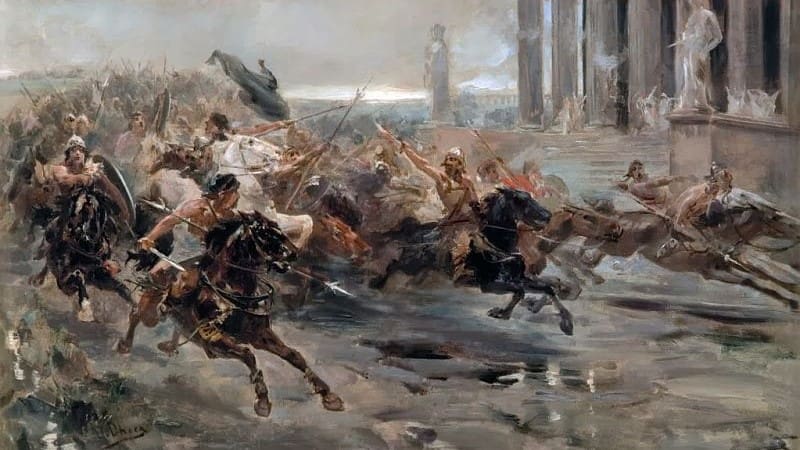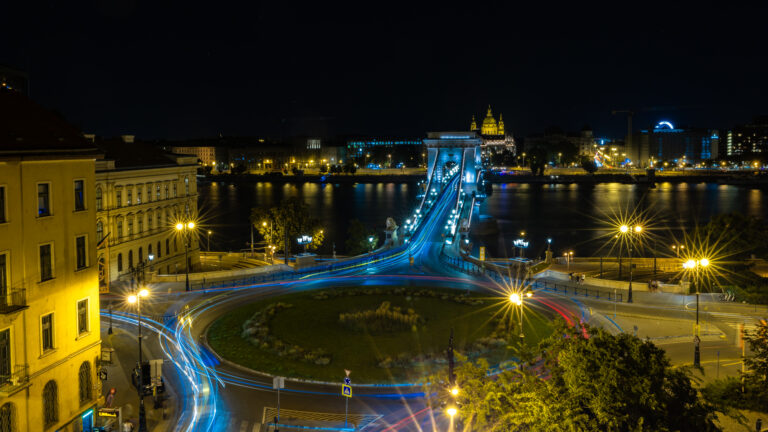On Thursday, shocking images spread virally across Twitter, showing a mob of illegal immigrants storming across the southern US border, overrunning Texas National Guard troops guarding the frontier.
If these migrant men had carried weapons, we would know exactly what this was. But as it happened, this infuriating violation of American sovereignty didn’t even make the news. If not for Twitter/X, the American people would barely know that it occurred.
As so often happens with me these days, I thought, ‘That never happens in Hungary.’
As I scrolled my social media feed late Thursday, I saw a second clip had gone viral: this short statement by Laura Jacobs, a clinician who works with transgendered people at a policy-making level in the medical body governing trans health care. Jacobs expressed excitement at how technological innovations promise to open up creative vistas in her field.
‘Do we have to stick to penis and vagina?’, she mused. ‘Can we have genitalia that look like flowers or abstract sculpture? Can we have multiple? Can they be interchangeable?’
My first thought was: Are the insane asylums all full? Are the prisons? Is there room for one more?
My second thought: That never happens in Hungary.
By now my Magyar friends are tired of hearing me say this. Some of them think that I’m so blinded by alarm at the decline of the US that I’m blind to real problems here in Hungary. I hope that’s not true—I love Hungary, but know it is no paradise—but it’s important that Hungarians understand how fast this insanity spread in my home country, and that it could easily happen here absent strength and vigilance.
Back in 2014, a prominent American physician contacted me to tell me that his elderly mother, a Catholic who came to the US after the Czech Communists released her from prison at the end of the 1950s, had just warned him that the things happening in America now—the wokeness everywhere—reminded her of Czechoslovakia at the beginning of the communist era.
It sounded alarmist to me. Even so, I made a habit of asking émigrés who had fled the Soviet bloc seeking freedom if the woke phenomenon reminded them of what they had left behind. They all said yes—and they were angry that Americans would not take them seriously. A decade later, their vision of the emerging soft totalitarianism in the West has made stunning progress, and is showing no real signs of stopping.
In the same way, when I tell Hungarians that the insanity gripping the United States could easily take over this country, they don’t want to believe me. It seems hardly possible.
What Hungarians must know is that anything is possible.
On March 15, I stood near the Museum and listened to Prime Minister Viktor Orbán give his national day speech, with a Hungarian friend next to me translating. What makes Orbán so outstanding among his peers in the West is that with the possible exception of Giorgia Meloni, he alone has a civilizational vision. He understands the ultimate stakes at issue in the conflicts and passions sweeping the West. And without a doubt he is the only politician at his level willing to take a firm stand against Western civilizational suicide.
Consider this passage from the Orbán address:
‘In the Western world today, millions of people think and live as if they have come from nowhere and are going nowhere. This is why they have no regard—and are convinced that they should have no regard—for anything or anyone: they start wars; they destroy worlds; they redraw the borders of countries; like locusts, they consume everything; they scorn the dead and deny the rights of those yet to be born.
We Hungarians live differently, and want to live differently. We come from somewhere, and we are going somewhere. All that we have, we received from our ancestors—and together with it, the mission to maintain it and pass it on. This is the essence of Hungarian freedom.
Whether he realized it or not, the prime minister highlighted a point made some years back by the late Polish sociologist Zygmunt Bauman. Bauman said that in ages past, man experienced his life as a Pilgrim: that is, traveling through time on a journey of purpose with others, passing familiar landmarks together, helping each other along the way, guided by faith and the memories of those who came this way before, all headed to the same destination.
In modern times, said Bauman, the Pilgrim has been replaced by the Tourist. The tourist moves through life without purpose. He comes from nowhere and is going nowhere other than where his passions take him. The only purpose in his life is to escape boredom—and this means, among other things, that he avoids commitment. His goal in life is to create maximum possibilities for individuals to fulfill their desires. He never thinks of the world he will leave behind for others; for the tourist, the only thing that matters is himself, and the current moment.
The way you choose to go through life—as a Pilgrim, or as a Tourist—will create very different civilizations. Orbán alluded to that in this passage from his speech:
‘A traveler is touring around Europe. He sees a man at the side of the road, breaking rocks with a sledgehammer. “What are you doing?” he asks.
“Can’t you see? I’m breaking rocks – that’s my job!”
Later he sees another man breaking rocks. “What are you doing?”
“Can’t you see? I’m building a cathedral!”
Today the European Left – including the Hungarian Left – is breaking rocks. This is their life: robots with no higher purpose, deprived of past and future.
But we are building a cathedral.’
This is why barbarians breach the borders of Italy, Spain, France, Britain, and America, but never cross the Hungarian frontier.
This is why states throughout the West allow their children to be propagandized to think that they can change their sex, and then allowed to surgically or chemically mutilate their bodies for this purpose—but it doesn’t happen in Hungary.
For now, at least, Hungary has a leader who sees his country as a nation of Pilgrims, not a nation of Tourists. ‘It is as simple as one plus one and as clear as day, because Hungary is a free and sovereign country. And so it will remain,’ said Orbán.
I’m not sure about Western Europe, but in America, we have virtually no senior politicians on the Left or the Right capable of saying this sentence about America, and meaning it. Not even Donald Trump, who, despite his usefulness as a weapon against the woke establishment, does not possess a civilizational vision, or any vision at all.
I say all this not to flatter Viktor Orbán, who doesn’t need the praise of an American writer. I say this not to glorify Fidesz, who should understand the gravity of the times, and clean up corruption so the parties that favor decadence and dissolution will have no grounds to ask for Hungarian votes. (I spoke recently to Polish conservatives who were sad that the Law and Justice party lost power, but who also said that the party’s indifference to corruption in its own ranks was a major factor in their defeat.)
No, I say this to warn the Hungarian people about what could happen to them if they stop thinking of themselves as Pilgrims, and instead join the Tourist masses of the West, where the political and cultural leadership behaves as mere tour guides.
Zygmunt Bauman is most famous for his concept of ‘liquid modernity’. Bauman said that in modern times, cultural change happens so fast that nothing has time to become ‘hard’ before it changes again. Thus, fluidity is the natural state of modern life, in all aspects. This, said Bauman, is why it makes sense for modern people to be Tourists, not Pilgrims. This is the form of identity that better fits the conditions of liquid modernity.
He is correct, in an analytical sense. But any nation that chooses the Tourist path will disappear in the flood of liquid modernity.
Open borders allows the frictionless movement of peoples, creating a civilizational deluge.
Open sexual standards causes men and women to waste their reproductive potential on erotic adventuring, without ever deciding to commit to another, and to children.
Open gender standards poisons the minds of the young, and leads them to desire to cope with their overwhelming anxiety by self-mutilation.
Open religious standards (that is, a laissez-faire attitude towards religious truth, disguised as tolerance) brings about indifference towards ultimate questions—the kinds of questions, and answers, that give shape and meaning to human life, and that open the mind to the transcendent dimension of existence.
And, to maximize individual choice, a society has to deny its past, to malign its heroes, and to insist that they have no claim on the way we live today. The Tourist is a lonely man, incapable of seeing beneath the surface of things, unable to control his desires, and too weak to form a bond of solidarity with others, out of fear that they might encroach on his liberty.
The ultimate Tourist is not free, but a slave to his passions, and to powerful institutions of the state and private life who cultivate and exploit those passions to maintain their power.
The Pilgrim, on the other hand, is a rebel against Tourism’s soft totalitarianism.
The Pilgrim thinks in terms of the community, in the sense that he finds his individual fulfillment in relation to his family, his friends, and his nation, with whom he journeys through time.
The Pilgrim thinks in terms of tradition, because he trusts that those who have traveled this path before him know the way, and he wants to make the way clear for those who will come after him.
Above all, the Pilgrim thinks in terms of God. He believes that God exists, and orders life. His pilgrimage is ultimately a journey to God—‘All roads end at a church,’ said a peasant woman in a Georgian film—and is filled with purpose because of this. There will be joy on the Pilgrim’s path, and there will be sorrow, even suffering—but all of it has meaning, because God is with us.
Because he experiences life in the light of transcendence, the Pilgrim does not think in terms of the Everlasting Now, but of eternity.
This is why he can give his life to
constructing projects—families, institutions, nations—that will outlast his brief sojourn on this earth.
Building medieval cathedrals typically took over 100 years, which meant that it was work that outlasted the lifetime of any craftsman. Yet they did it, because they believed in eternity. Indeed, the architects often placed designs on the roofs of these Gothic masterpieces that could not be seen by anyone on the ground below, but only by the eye of God. They built, ultimately, for Him, and for eternity.
This is radically opposed to the spirit of the modern age. If you do not believe in God, if you do not believe in transcendence and tradition, if you do not believe in your own people, then you will have no purpose in life other than satisfying your own immediate desires. You will fail to protect the people, the institutions, the ways of living, and all the things that give our journey through this life meaning and weight.
Why is it so difficult for Western people to see this? Why can they not perceive that they—that we—are surrendering the things that make us who we are, and long have been? Why are we allowing ourselves to be seduced by slavery?
If you had spoken that way to me twenty years ago, I would have thought you were an alarmist. I would even have thought so ten years ago, before the testimony of those who endured Soviet totalitarianism opened my eyes to the very different totalitarianism that was slowly overtaking the West. But now? It is as clear as day.
It is clear to Viktor Orbán too, which is the main reason I moved to Hungary: to learn what I can about mounting a resistance. To see if there are any lessons to be learned in how to be a political Pilgrim in a Western world overrun with political Tourists (even among the parties of the Right). And to be reminded, while it is still possible, what normal life in Western civilization looks like, without barbarians from other lands crowding the streets, and the rainbow flags of conquerors flying from every window.
Like many American conservatives, I became skilled at throwing broken rocks through the windows of the woke Establishment. But I moved to Hungary to see if it is possible to learn how to build a cathedral amid the remnants of civilization.
The fact that Hungary has to fight like hell for its right to be normal is a sign of the times. So is the fact that in America, as in almost every Western country, the borders are a fiction, our heroes are hated, our free speech is taken away from us, scientists proclaim the desirability of sculpting the genitals of children into works of art—and these things barely make news. We have grown accustomed to decadence.
That doesn’t happen in Hungary. But for how long?








